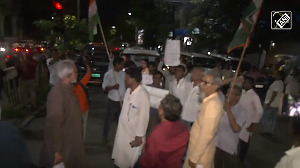Salman Khurshid is likely to look at foreign affairs as a reflection of India's domestic development indicators, writes Jyoti Malhotra
The appointment of Salman Khurshid as India's new external affairs minister is the best thing that could have happened to the foreign office. Khurshid is articulate, exceedingly bright and comfortably grounded in the liberal school of Nehruvian politics. In any case, in recent months, he was being called upon to speak for India -- instead of then external affairs minister S M Krishna -- at track-two dialogues with several countries, especially in India's neighbourhood, including Bangladesh, the Maldives and Afghanistan.
Naming Khurshid to one of the four coveted portfolios that make up the Cabinet Committee of Security -- the others being home, defence and finance -- is a powerful signal that the Congress intends to return to the business of governance. S M Krishna had mostly abdicated himself from running the ministry, but Khurshid is expected to demonstrate, in the nicest way possible, that he's the boss.
In his first meeting with officers of the level of joint secretary and above at the ministry on Sunday, Khurshid agreed that the world had changed since he was last in South Block 20 years ago and promised to be "transparent" in his dealings.
His first meeting as external affairs minister was with Bangladesh's leader of the opposition Khaleda Zia on October 30. He will also preside over a regional meeting of foreign ministers from the Indian Ocean rim countries, at which Iran and Sri Lanka are also going to participate. His first visit abroad is to the Asia-Europe meeting at the end of the week in Laos.
Certainly, Khurshid's liberal streak will encourage the best of the Indian democratic spirit, in pushing the envelope with Pakistan, Nepal or Bangladesh. He is clearly interested in a signature on the Teesta waters pact with Bangladesh and knows that country's political establishment well. He will support a visit by Prime Minister Manmohan Singh to Pakistan, a visit that now looks will take place after elections in Pakistan. He will push for greater Indian involvement in Afghanistan, especially with western troops ready to leave that country in 2014.
In other words, Khurshid is expected to do what he has said so often, off the record: "It is imperative to normalise India's relations with its neighbours, so that people can travel to each other's countries without fear or favour."
As for relations with the US, the European powers, China, Russia and Japan, Khurshid is expected to be in sync with the direction that has been set thus far by Foreign Secretary Ranjan Mathai, the prime minister and national security adviser Shivshanker Menon. In light of the forthcoming US presidential elections, India seems to be on good terms with both the Democrat and Republican parties; Khurshid's left-of-centre orientation, however, means that he instinctively favours the egalitarian strokes that have come to be a defining feature of Barack Obama's tenure in office.
Khurshid's return to the Foreign Office -- he was minister of state for external affairs from 1992-96, during PV Narasimha's tenure as prime minister -- means that he already understands the business of foreign policy. At the time, he made a striking impression with his travels to less glamorous parts of the globe, such as Central Asia, and is remembered fondly there even now.
The main thing is that Khurshid is likely to look at foreign affairs as a reflection of India's domestic development indicators. This means that he will welcome the synergy with India's commerce ministry, and use trade and investment as well as foreign direct investment as a means to push the strategic cause.
The US is still India's largest trade partner a although, the European Union, a bloc of 27 countries, docks higher figures than the US -- with China slowly catching up. Russia seems to have significantly fallen in the priority charts for a variety of reasons; both countries have still to settle the cost of power that will be produced by the Kudankulam civil nuclear power plant that the Russians have built in Tamil Nadu, with Moscow insisting that the cost of power will go up if it has to be subservient to India's civil nuclear liability laws.
Still, Khurshid will have to pick both his battles and his interests if he has to be successful as foreign minister. There is simply too much to do and the remaining 18 months before elections are due in 2014 will be the UPA's "legacy" period; Khurshid's performance in the ministry of external affairs will form a big part of whether the Congress-led alliance can impress India's voters.











